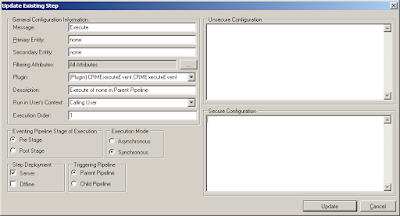The mysterious CRM Lookup (I)
The mysterious CRM Lookup (II)
The mysterious CRM Lookup (III)
A few days ago, I saw a post on the Microsoft Dynamics CRM Chinese Forum about how to add filter to LookupMulti.aspx ?
I think it's a very common requirements, so I'd like to give my idea.
When I start with this customization, my bottom line was: Not change any files/databases. However this customization should be marked as a "unsupported customization" (call CRM/JS function directly).
OK, the question was:
A customized entity: ShippingMark (new_shippingmark), it has N:1 relationship with Account; it also has N:N relationship with Quote.
And as we known by default, Quote has N:1 relationship with Account(via customerid)
So the relationship is simple: Account -< (customerid)Quote >< ShippingMark(new_accountid) >- Account
What the user wants was classic: Open a Quote record, then go to Add Existing ShippingMark, then in the LookupMulti page, only return the ShippingMark which has the same Account(new_account) with Quote's(customerid).
There are two parts of the code: server side Plugin.Execute event and client side CRM.Onload event. What the client side code does is: create a custom lookup window, and pass the customerid as a parameter, so the lookup URL looks like: ?&id=?, then the server side plugin will replace the FilterXml query string based on the parameter.
I give the code prototype for this specific requirement, you need to modify it for re-use. This technique should work for both LookupSingle.aspx and LookupMulti.aspx.
1. Plug-Ins
Register the Execute message on the Pre Stage/Synchronous/Server/Parent Pipeline.

/*
* Microsoft Dynamics CRM Lookup Filter
* Plug-Ins: Execute message on the Pre Stage/Synchronous/Server/Parent Pipeline.
* Jim Wang @ Aug 2009, http://jianwang.blogspot.com, http://mscrm.cn
*
*/
using System;
using System.Collections.Generic;
using System.Linq;
using System.Text;
using System.IO;
using System.Web;
using Microsoft.Crm.Sdk;
namespace CRMExecuteEvent
{
public class CRMExecuteEvent : IPlugin
{
string lookupId;
public void Execute(IPluginExecutionContext context)
{
lookupId = HttpContext.Current.Request.QueryString["id"] == null ? null : HttpContext.Current.Request.QueryString["id"].ToString();
if (lookupId == null) return;
try
{
if (context.InputParameters.Contains("FetchXml"))
{
string beforeXml = (String)context.InputParameters["FetchXml"];
if (beforeXml.Contains("<entity name=\"new_shippingmark\">") && beforeXml.Contains("xml-platform"))
{
//Customise the FetchXml query string
string afterXml =
"<fetch version='1.0' page='1' count='100' output-format='xml-platform' mapping='logical'> " +
"<entity name='new_shippingmark'> " +
"<attribute name='new_shippingmarkid' /> " +
"<attribute name='new_name' /> " +
"<attribute name='createdon' /> " +
"<order attribute='new_name' /> " +
"<link-entity name='quote' to='new_accountid' from='customerid'> " +
"<filter type='and'> " +
"<condition attribute = 'customerid' operator='eq' value='" + lookupId + "'/> " +
"</filter> " +
"</link-entity> " +
"<filter type='and'> " +
"<condition attribute='statecode' operator='eq' value='0' /> " +
"<condition attribute='new_name' operator='like' value='%' /> " +
"</filter> " +
"</entity> " +
"</fetch>";
//Replace the FetchXml query string
context.InputParameters["FetchXml"] = beforeXml.Replace(beforeXml, afterXml);
}
}
}
catch (System.Web.Services.Protocols.SoapException ex)
{
throw new InvalidPluginExecutionException("An error occurred in the CRM plug-in.", ex);
}
}
}
}
2. Quote.OnLoad()
var relId = "new_new_shippingmark_quote";
var lookupId = crmForm.all.customerid;
var lookupEntityTypeCode;
var navId = document.getElementById("nav" + relId);
if (navId != null)
{
var la = navId.onclick.toString();
la = la.substring(la.indexOf("loadArea"), la.indexOf(";"));
navId.onclick = function()
{
eval(la);
var areaId = document.getElementById("area" + relId + "Frame");
if(areaId != null)
{
areaId.onreadystatechange = function()
{
if (areaId.readyState == "complete")
{
var frame = frames[window.event.srcElement.id];
var li = frame.document.getElementsByTagName("li");
for (var i = 0; i < li.length; i++)
{
var action = li[i].getAttribute("action");
if(action != null && action.indexOf(relId) > 1)
{
lookupEntityTypeCode = action.substring(action.indexOf("\(")+1, action.indexOf(","));
li[i].onclick = CustomLookup;
break;
}
}
}
}
}
}
}
function CustomLookup()
{
var lookupSrc = "/" + ORG_UNIQUE_NAME + "/_controls/lookup/lookupmulti.aspx?class=&objecttypes=" + lookupEntityTypeCode + "&browse=0";
if(lookupId != null && lookupId.DataValue != null && lookupId.DataValue[0] != null)
{
lookupSrc = lookupSrc + "&id=" + lookupId.DataValue[0].id;
}
var lookupItems = window.showModalDialog(lookupSrc, null);
if (lookupItems) // This is the CRM internal JS funciton on \_static\_grid\action.js
{
if ( lookupItems.items.length > 0 )
{
AssociateObjects( crmFormSubmit.crmFormSubmitObjectType.value, crmFormSubmit.crmFormSubmitId.value, lookupEntityTypeCode, lookupItems, true, null, relId);
}
}
}
microsoft crm online |business contact manager |open source crm |cheap crm |crm magic quadrant |
Hiç yorum yok:
Yorum Gönder